|
|
Environmental Research 2.0 (2025 - 2027)
|
Wasser:KRAFT (2016 - 2018)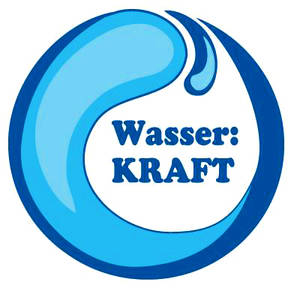
Energie aus Wasser – Wasserkraft und Algen: Energiequellen der Zukunft
Children and teenager from the region of Mostviertel work together with researchers and experts to explore water power. Experts explain how to gain water power using the example of regional water power stations, and ecological consequenzes for streams. Moreover the children learn about microalgae and how to produce engergy out of it. The project is funded by the Austrian Ministry for Transport, Innovation and Technology, it is a cooperation of WasserCluster Lunz, BIOENERGY 2020+, EVN and Hydro-Connect and it is performed in the course of the programm "Talente regional" from the Austrian Research Promotion Agency (FFG).
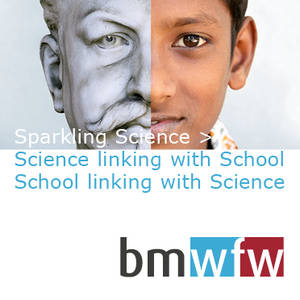
Sparkling Science Project "PowerStreams" (2014 - 2016)
In this education-cooperation-project, scientists work together with schools to measure the efficiency and sustainability of nutrient and organic matter uptake in slightly to heavily polluted streams. Students will assist the scientists in short term nutrient and DOC retention experiments in the field and they will measure the production of greenhouse gases in stream sediments in the lab. Our partner schools are Francisco Josephinum, BRG Waidhofen/Ybbs, BORG Mistelbach, and HBLFA Raumberg-Gumpenstein.
Funding: Ministry of Science, Research, and Economy (BMWFW),within the framework of the research-education-programme Sparkling Science.
Links:
www.sparklingscience.at
www.bmwfw.gv.at
www.brgwy.at
www.josephinum.at
www.borgmistelbach.ac.at
www.raumberg-gumpenstein.at
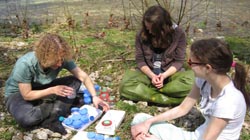
Project „Pro aqua, pro terra“ (2013 - 2014)
Partner schools: BRG Waidhofen a.d. Ybbs, Francisco Josephinum Wieselburg, HLFS Elmberg, HLUW Yspertal
In the course of the research project „Pro aqua, pro terra“, the WasserCluster Lunz cooperates with partner schools in different ways. In April 2013, students of the BRG Waidhofen visited Lunz to learn how to develop a scientific study design and perform a lab experiment about aquatic respiration based on scientific principles. Besides, we sampled macrozoobenthos in the stream, measured water quality and determined the ecological state of the Lunzer Seebach. In summer, students of the Francisco Josephinum and the HLUW Yspertal will conduct experiments with denitrifying bio-reactors for their pre-scientific thesis (Fachbereichsarbeit/Diplomarbeit).
(Funding: Amt der Niederösterreichischen Landesregierung, Abteilung Wissenschaft)
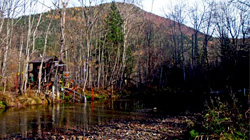
Project „Forschung im Fluss – Wie beeinflussen wir unsere Bäche“ (2011-2012)
The aim of this project is to give young people an understanding of the sensitivity of stream ecosystems and the complex interaction between humans and the environment. The students try to answer their own research questions about ecological interrelations via in-situ surveys of the stream and experiments in the lab (explorative learning).
(Bildungsförderungsfond; Funding bodies: Ministries of Education and of Science and Research)
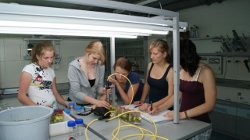
Forschungswoche „Ökosystem Bach“; HLFS Ursprung; June 2011
The students investigated the ecological state of the Lunzer Seebach with regard to nutrient content, macrozoobenthos and stream morphology. They carried out lab experiments to analyse influencing parameters on the aquatic respiration and production. In addition, they learned how to determine ammonium, phosphate and chlorophyll a concentrations in the water.
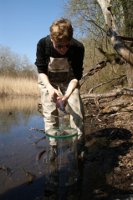
Project „WESPe – Wetlands, Environment, Society, and Pressures“ (2009-2011)
Together with our partner schools, we investigated the impact of changed environmental conditions (global climate change, altered hydrologic regime) on the ecological and social carrying capacities of the urban floodplain Lobau in Vienna. Along with experiments examining temperature effects on primary production and methane emissions, the relevance of wetlands for the quality of life for teenagers was an important objective of the project. (Programme Sparkling Science; Funding bodies: Federal Ministry for Science and Research; Partner schools BRG 18, GRG 10; CMS Orth/Donau, Francisco Josephinum Wieselburg). Mehr: www.sparklingscience.at
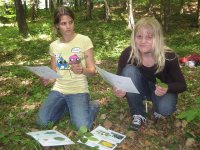
Project „Natura 2000-Schulbox“ (2009-2011)
The aim of this project was the development and optimisation of a teaching material collection for action-oriented teaching of the goals and ideas of Natura 2000 in schools. The main focus was on the investigation of different Natura 2000 habitats which provided the students with the tools of nature protection research.
(Europäischer Landwirtschaftsfonds für die Entwicklung des ländlichen Raumes; Funding bodies: EU, Government of Lower Austria, Ministry of Environment; Partner schools: MS Eichgraben, CMS Orth/Donau, HS Lunz)
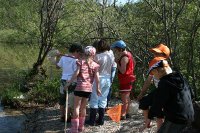
Project „Ich seh, ich seh – Mikrokosmos Lunzer See“ (2007-2008)
Together with students from our partner schools, we investigated the fascinating microcosm of the Lunzer See (plankton, benthic organisms).
(Bildungsförderungsfond; Funding bodies: BMUK, BMWF; Partner schools: HS Lunz, VS Lunz, HS Göstling, BRG Scheibbs)



